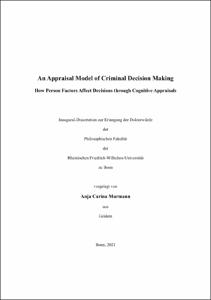An Appraisal Model of Criminal Decision MakingHow Person Factors Affect Decisions through Cognitive Appraisals

An Appraisal Model of Criminal Decision Making
How Person Factors Affect Decisions through Cognitive Appraisals

| dc.contributor.advisor | Banse, Rainer | |
| dc.contributor.author | Murmann, Anja Carina | |
| dc.date.accessioned | 2021-02-19T16:05:05Z | |
| dc.date.available | 2021-02-19T16:05:05Z | |
| dc.date.issued | 19.02.2021 | |
| dc.identifier.uri | https://hdl.handle.net/20.500.11811/8929 | |
| dc.description.abstract | In explaining and predicting criminal behavior, research has mainly concentrated on stable person factors such as psychopathy or self-control. However, the causal processes underlying these correlates of crime are largely unknown. In the present research, the Appraisal Model of Criminal Decision Making is introduced. The model postulates the dimensions Incentive, Feasibility, Legality, Morality, Likelihood, and Level of Punishment as crucial cognitive mechanisms in delinquent decisions. Five studies investigated whether the dimensions affect decision making in general, and whether they interact with established criminogenic risk factors. Participants were presented with vignettes that were manipulated regarding the appraisal dimensions and asked whether they would execute the respective behaviors. The vignettes described low-level criminogenic opportunities in Studies 1 and 2 (N = 299), and dissexual behavior opportunities in Study 3 (N = 685). All three studies showed that the appraisal dimensions influenced decisions. However, the Incentive dimension did not affect decisions in Studies 1 and 2, which might be explained by a hot-cold-empathy gap. In both behavior domains, the manipulation of Morality had the strongest influence on decision making. Additionally, there were indications that personality factors (psychopathy, morality, and self-control) interacted with appraisal dimensions. In Study 4, former offenders (N = 22) were interviewed about appraisal processes in the moment of decision making. All of the appraisal dimensions were named; however, which dimensions were named depended highly on the context. Some participants found illegal actions particularly appealing, which suggests that the Legality dimension might interact with personality factors. In Study 5, a regression-analytical approach was chosen to overcome the methodological problems from Studies 1-3. In a pre-study, an independent sample was asked to rate all vignettes regarding the appraisal dimensions. The normative values generated in the pre-study were analyzed in combination with the decision values of the main study participants (N = 198). All dimensions except Feasibility affected decision making. Furthermore, participants high in psychopathy weighted the Morality and Legality dimensions less strongly, and participants high in sensation-seeking weighted the Likelihood of Punishment and Legality dimensions less strongly. These results indicate that appraisal processes provide a causal link between established criminogenic personality factors and criminal behavior and thus contribute to a better understanding of crime. | en |
| dc.language.iso | eng | |
| dc.rights | In Copyright | |
| dc.rights.uri | http://rightsstatements.org/vocab/InC/1.0/ | |
| dc.subject | Bewertungsmodell krimineller Entscheidungsfindung | |
| dc.subject | Delinquenz | |
| dc.subject | Szenarios | |
| dc.subject | Vignetten | |
| dc.subject | Dissexualität | |
| dc.subject | Psychopathie | |
| dc.subject | Selbstkontrolle | |
| dc.subject | Sensation-Seeking | |
| dc.subject | Appraisal Model | |
| dc.subject | Criminal Decision Making | |
| dc.subject | Delinquency | |
| dc.subject | Scenarios | |
| dc.subject | Vignettes | |
| dc.subject | Dissexuality | |
| dc.subject | Psychopathy | |
| dc.subject | Self-control | |
| dc.subject.ddc | 150 Psychologie | |
| dc.title | An Appraisal Model of Criminal Decision Making | |
| dc.title.alternative | How Person Factors Affect Decisions through Cognitive Appraisals | |
| dc.type | Dissertation oder Habilitation | |
| dc.publisher.name | Universitäts- und Landesbibliothek Bonn | |
| dc.publisher.location | Bonn | |
| dc.rights.accessRights | openAccess | |
| dc.identifier.urn | https://nbn-resolving.org/urn:nbn:de:hbz:5-61300 | |
| ulbbn.pubtype | Erstveröffentlichung | |
| ulbbnediss.affiliation.name | Rheinische Friedrich-Wilhelms-Universität Bonn | |
| ulbbnediss.affiliation.location | Bonn | |
| ulbbnediss.thesis.level | Dissertation | |
| ulbbnediss.dissID | 6130 | |
| ulbbnediss.date.accepted | 15.01.2021 | |
| ulbbnediss.institute | Philosophische Fakultät : Institut für Psychologie | |
| ulbbnediss.fakultaet | Philosophische Fakultät | |
| dc.contributor.coReferee | Mokros, Andreas |
Dateien zu dieser Ressource
Das Dokument erscheint in:
-
E-Dissertationen (642)




